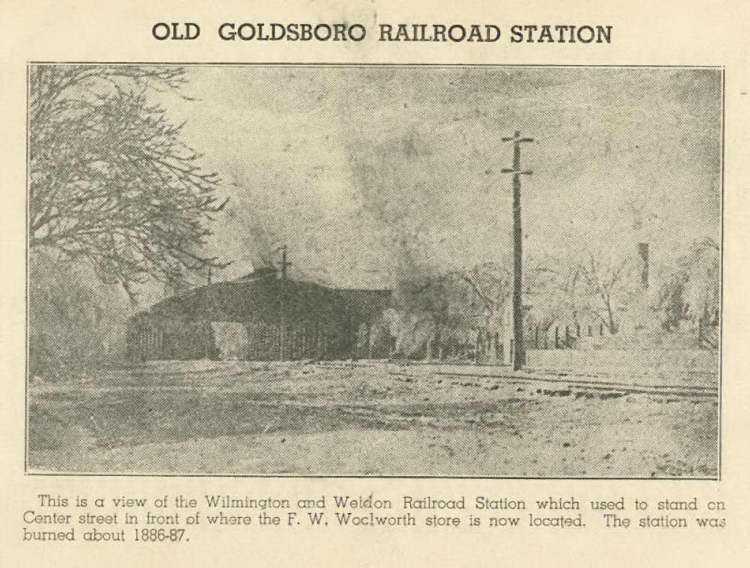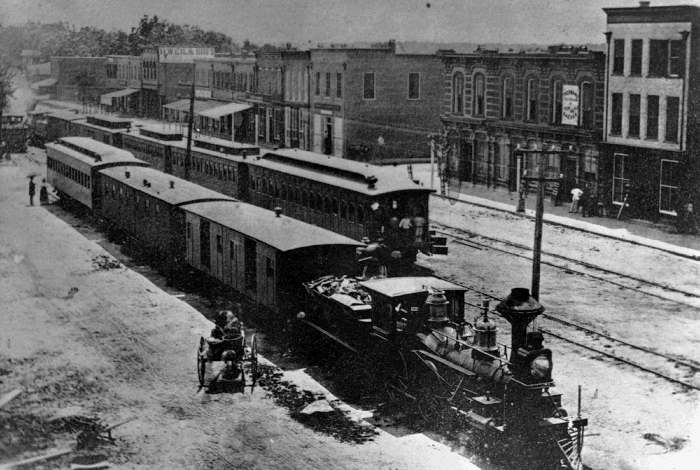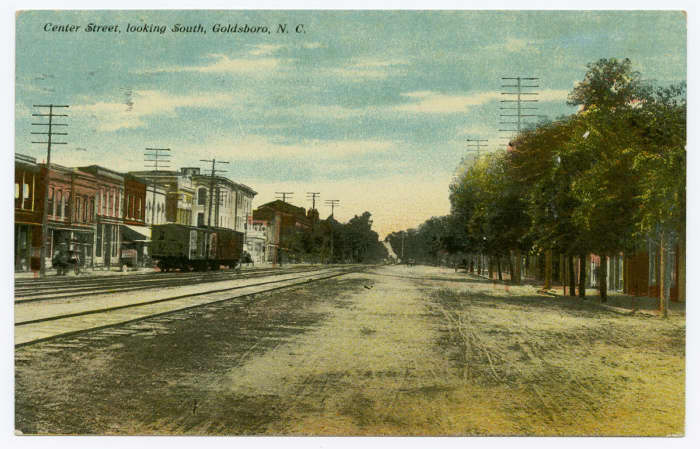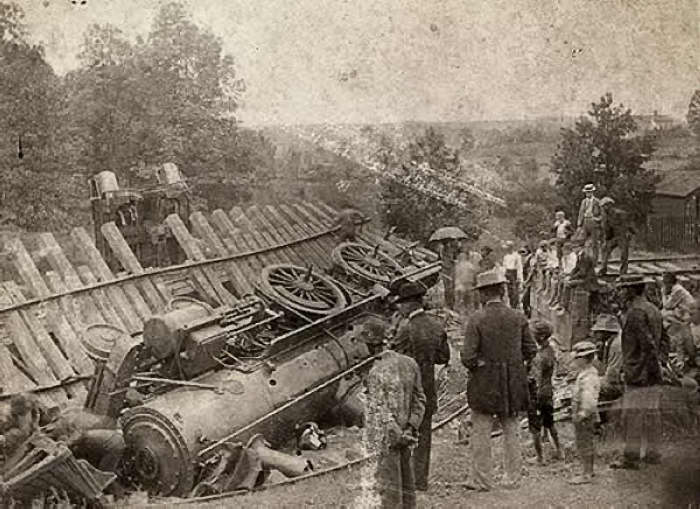|
 Caption: This is a view of the Wilmington and Weldon Railroad Station which used to stand on Center Street in front of where the F. W. Woolworth store is now located. The station was burned about 1886-87. Photo and information from War-Time Reminiscences and Other Selections by James Monroe Hollowell. Pg 5 - That portion of the city north of Ash street was woods. Where the Knitting Mill stands was a two-story dwelling, occupied by John Britt, an engineer on the W. & W. railroad, and there was another dwelling on the lots that the late Mrs. Richardson owned, and where the stock pen of the Southern railway stands was a dwelling occupied by John Taylor. About where the old freight depot of the Norfolk & Southern now stands was a dwelling owned by Ira Langston, when the depot was to be built in 1857. Pg 9 - On Feb. 3rd, 1854, the North Carolina Railroad Company was granted a right of way to construct their track on West Centre street. Pg 13 - The W. & W. Railroad was completed to Goldsboro in 1836. I was given this date by Col. Nelson. When the road had reached a point about half way from Goldsboro to the river bridge, there was a big celebration given in Old Waynesboro. A military company came from Wilmington, bringing a cannon with them. Gov. Dudley came down from Raleigh. He came through the country by private conveyance and spent the night before the celebration at the home of John W. Sasser's, whose residence was near Pearson's bridge. The governor drove in the next morning and was met a mile or two from town by the military company and a large part of men on horses, who escorted him into town, where he addressed the big crowd gathered. Pg 17 - The N. C. R. R., (now the Southern), was not intended at its charter to run into Goldsboro, but was to connect with boats on the Neuse river at old Waynesboro, and a track was run down to the river. It curved to the right just after crossing Little river bridge, about where Weil's brick yard is and ran across the field now owned by Maj. Grant, coming to the river near O'Berry's log boom, and a warehouse was built on the river bank. I don't know whether any business was ever done between the railroad and steamboats or not. The warehouse got burned in April, '61. Pg 22 - In those days the W. & W. R. R. relayed engines here, and there was always three or four engineers laying off between trips and equally as many from the N. C. R. R. Nearly all were Northern men and full of fun, and they would gather around the hotel at night and crack jokes, and anyone who could listen and not laugh was a poor judge of a joke. Pg 23 - None of the engines were numbered and all bore names. They were beauties - wide brass bands around the boilers, cylinders encased in brass - and they were kept neat and clean. Pg 28 - The railroads have never given it (Goldsboro) the benefits it was entitled to by reason of its location. Col. L. W. Humphrey, while president of the A. & N. C. R. R. in the seventies, was the only railroad manager who seemed to recognize what the town was entitled to in the way of reduced rates. I remember when he hauled cotton from here to Norfolk for one dollar per bale while the A. C. L. and R. & D. railroads were charging one dollar and seventy-five cents, and gave a corresponding decrease in rates on merchandise coming from Northern markets here. Pg 32 - Goldsboro has had two dreadful railroad accidents, that of the killing of Chars. E. Nelson in 1875, and Miss Rosenthal, in 1887.
"Our Heritage" When the Wilmington & Weldon Railroad was built through Wayne County in 1836-1840, it was intended that it should go through the village of Waynesborough, the county seat. The engineers examined the topography of the land in & around the village & decided since it had been flooded several times by the Neuse & Little River that it would be best to bypass such a wet location. The railroad was built around the village on higher ground & it was here that the city of Goldsboro was named for Matthew W. Goldsborough, one of the engineers who laid out the railroad. The first depot in Goldsboro was located at the corner of Walnut & Center streets since the railroad ran down the center of town. The county seat was moved to Goldsboro in 1847 & in the early 1850s the Atlantic & North Carolina Railroad was built from Charlotte to Greensboro to Raleigh through Goldsboro to Morehead City.
The Wilmington & Raleigh Rail Road Company, 1833-1854 The MacRae-Brazier Map of 1833 lists only six towns or named locations between Wilmington and Weldon that existed prior to the railroad that would eventually become railroad towns - South Washington, Wrightsville Post Office, Waynesborough, Rocky Mount, Enfield and Halifax. Not listed on the map, but existing in 1833, was Duplin Cross Roads, the site of a post office. By 1858, stations listed with their agents between Wilmington and Weldon included Marlboro, Leesburg, Teachey’s, Magnolia, Warsaw, Bowdens, Faison, Mount Olive, Dudley, Everettsville, Goldsboro, Pikeville, Nahunta, Black Creek, Wilson, Joyner’s Depot, Rocky Mount, Battleboro, Enfield and Halifax.
Wayne County Register Of Deeds Know all men by these presents that we the subscribers Residents of the County of Wayne and Lenoir and State of North Carolina for and in consideration of one dollar paid to each of us by the President and Directors of the Wilmington & Raleigh company and in the further consideration of the advantages of a rail road passing through our lands do hereby consent to grant sell & convey to the said Wilmington and Raleigh rail road company such portion of said lands as may be necessary for a Rail road which the said company have in contemplation to construct agreeably to their charter in such directors as their engineer may think proper to run and lay off. In Witness whereof we have hereunto set our hands and seals the 25th of March 1836. Witnesses: Jas. K. Green, James B. Whitfield, A. F. Moses, Stephen White, W. D. Cobb, Thos. Scott, Needham Whitfield, Jn. H. Bryan, W. D. Moseley, C. Wooten, W. S. G. Andrews, Wm. Thompson, John Everertt, J. G. Slocumb, John C. Slocumb, Willis Hall, H. W. Husted, Wm. Carraway and G. W. Collier
Wayne County Feby Term 1838
Center Street, looking North, Goldsboro, N.C.

The Wilmington and Raleigh Rail Road Company acknowledge themselves indebted to S. & E. Everett in the sum of one hundred dollars for Excavation & Embankment which sum they promise to pay to the said S. & E. Everett or their order at their office in the Town of Wilmington on the 28th day of December 1840 with interest at the rate of six per cent per annum. Issued under authority of Resolutions of the Stockholders and of the President and Directors bearing date the 19th of May 1838. By virtue whereof this Bond is signed by the President and Treasurer and the seal of the Company affixed, done at the Office of the Company in the Town of Wilmington, North Carolina this 27th day of May 1839.
James S. Green Treas'r Wayne County, NC - Miscellaneous - Rail Road Records - CR 103.925.6 - Folder 1841-1848
The Wilmington and Raleigh Rail Road Company acknowledge themselves indebted to S. B. Spruill in the sum of Six hundred & sixty one dollars for Rails which sum they promise to pay to the said S. B. Spruill or his order at their office in the Town of Wilmington on the 4th day of July 1841 with interest at the rate of six per cent per annum. Issued under authority of Resolutions of the Stockholders and of the President and Directors bearing date the 9th and 19th of May 1838. By virtue whereof this Bond is signed by the President and Treasurer and the seal of the Company affixed, done at the Office of the Company in the Town of Wilmington, North Carolina this 4th day of July 1839.
James S. Green Treas'r Wayne County, NC - Miscellaneous - Rail Road Records - CR 103.925.6 - Folder 1841-1848
The Wilmington and Raleigh Rail Road Company acknowledge themselves indebted to David Jones in the sum of one thousand & eight two dollars for Bridges which sum they promise to pay to the said David Jones or his order at their office in the Town of Wilmington on the sixth day of July 1841 with interest at the rate of six per cent per annum. Issued under authority of Resolutions of the Stockholders and of the President and Directors bearing date the 9th and 19th of May 1838. By virtue whereof this Bond is signed by the President and Treasurer and the seal of the Company affixed, done at the Office of the Company in the Town of Wilmington, North Carolina this 6th day of July 1839.
James S. Green Treas'r Wayne County, NC - Miscellaneous - Rail Road Records - CR 103.925.6 - Folder 1841-1848
Wilmington Journal November 20, 1862 At a meeting of this body on Saturday last, the following appointments were announced:
Wilmington and Weldon Road State Directors:
North Carolina Postcard Collection

Goldsboro News Argus The corner lot belonging to the N.C.R.R. Co., near the warehouse of that company at the North end of W. Centre Street, has been leased for a term of years by Messrs. Royall and Borden, the widely known, popular and reliable furniture firm of this city, who have now under course of construction thereon a commodious two story building, which will be used by them as a mattress factory and the same will be operated on an extensive scale. The new enterprise will be in keeping with the characteristic aggressiviness of its proprietors, and will, we are sure, meet with the same gratifying success that follows their every undertaking.
General Hill - Promoter of Railroad Miss Sallie Cox - Chief Operator John Powell & Uriah Denning vs. Wilmington & Weldon Railroad, 1873
Foot Steps in the Sand The Wilmington and Weldon R.R. ran within a mile and a half of our house, every evening a train called "The Shoe Fly" (I've no idea why it was called that or if it was a passenger or freight train) passed and it's whistle gave me the same weird thrill that the crowing of the rooster did, but that was quite natural, for there was a story which said, there was a young engineer killed in a wreck on this train, ever after the whistle said "Wil-lie Lee, Wil-lie Lee, O Willie, O Willie," and I could say I heard it. A narrow strip of pine woods hid the trains from view of the house; our farm or most of it, lay between the woods and the house, so it made a nice walk on a Sunday afternoon, to see the trains pass. This was looked forward to with eager anticipation, though I always had to hold onto someone, as I had the sensation of being drawn toward the train. I was actually afraid of being sucked under it, though I believe this is the first time I have confessed as much. What a wonderful sight that train was to me, though the smoke stack was almost as large as the engine. I suppose those trains gave me my first realization of a world beyond the boundaries of grand-father Newman Potts' old plantation - peopled by my uncles, aunts, cousins and a few friends. It is said that our departure from North Carolina was the object of a lot of attention, and some adverse comments, when after we'd left, The Goldsboro news papers came out with the sensational story that a train load of the fairest daughters of old North Carolina had left Goldsboro bound for Utah, accompanied by a half dozen Morman Elders. Mother, her four daughters, four sons and Luther Coats, mother's convert, must have made quite an impression on the ticket agent. The trip to Utah was almost indescribable. We younger children had never been on a train before, and to me it was almost too thrilling; every time it rounded a curve, it seemed to me it nearly left the track. I clung to the arms of my seat to keep from being flung in the isle. The creaking of the cars was frightening. After the first day or two, I began to enjoy the scenery more. I still remember how I admired the hills and cliffs of Tennessee, and the green fields of Kentucky, with the white houses in the distance and the white fences everywhere. In Corinth, Mississippi, where we had to change trains, we stopped several hours. Hattie met a young man in uniform who was so impressed by her that he later went to Utah, and they corresponded for a while. He even proposed to her. 'Twas my task to compose the letter of refusal to his offer of marriage. It seems I could always tell others what to say, though I was always speechless when I had to speak for myself. As the train took us farther and farther west, we began to watch for the mountains and the first snow capped mountains we saw were a wonderful sight for all of us. When we got into Wyoming, miners began to get on the train with their heavy coats and telescopes and suit cases. The women wore the first fur-trimmed coats I had ever seen. Finally, we were in Utah and our feelings were such that it was easy for us to imagine how Brigham Young felt when he said the famous words, "This is the Place". We arrived in Salt Lake City, after our long and extremely tiresome journey, on a cold slushy day in March 1901. I will confess, I was slightly disappointed as it was such a grimy looking place, not at all like my imaginative conception of a beautiful "Zion". However, seeing the spires of the Temple in the distance, towering against the majestic snow-capped mountains, gave me hope there was a more attractive part of the city than that surrounding the Oregon Short Line Railroad Depot. In my eagerness to reach our new home, I soon forgot my apprehension and entered whole heartedly into a new and different way of life.
"Our Heritage" A History of Dudley During the Reconstruction period, a black man by the name of John F. Baker of Dudley was elected as a member of Congress, but he was mysteriously killed as he boarded the train at Dudley enroute to Washington to be sworn in. The black postmaster by the name of Will was later assassinated.
Newbern Daily Progress A man by the name of Elisha Herring was killed on the W. & W. R. R. last night near Dudley Station in this county. He had been in Goldsboro during the day, left on the 3 o'clock train for home. Being somewhat intoxicated he refused to settle his fare when called on by the conductor who promptly discharged his duty by putting him off the train at the first convenient place which was Everettsville a village distant 8 miles from this place. From thence Herring pursued his way homeward on foot until overcome with intoxication he fell upon the track. In this situation he was discovered by the engineer of the 8 o'clock train but not in time to stop the locomotive, the cow catcher of which struck him upon the side of the head knocking him off of the track and inflicting a terrible wound from which he died before reaching Goldsboro.
Newbern Daily Progress Distressing Accident Last Monday morning, the freight train going South which left here about day break ran over a man at Everittsville, crushing both feet in a shocking manner and leaving only the large toe on each foot. The name of the unfortunate man is Wm. Farrell. He went down that morning on the passenger train, it is supposed, as far as Dudley, got off there and is supposed to have been making his way back, but lying down on the track, fell asleep and the appalling injury to his mangled limbs is the deplorable consequence. He was brought up to town last night, placed under the care of Dr. Wm. H. Finlayson who called to his assistance Drs. Moore Davis and Craton but the unfortunate sufferer was too weak to undergo any operation - up to the time of this writing. He will inevitably lose both feet nor does there exist scarcely a hope that his life can be saved. We need scarcely add the afflicted sufferer is said to have been deeply under the influence of liquor when he left here. Rough Notes.

Wilmington Journal Distressing Accident We learn that yesterday evening about six o'clock while the up passenger train on the Wilmington and Weldon Railroad was stopping at Everettsville taking on or putting off passengers, it was run into by a freight train also going up. The collision was not sufficient to seriously damage the train but we regret to learn that Baggage Master Comann was killed and Conductor Laspeyre's leg and thigh so broken and mangled that he is not expected to live. No other person hurt. Mr. Comann was struck on the side of his chest by the platform of one of the cars and killed immediately. Mr. Laspeyre was jammed between the platforms and his whole limb from the upper part of the thigh down the leg horribly crushed. When the freight train struck the passenger train it caused the platforms of the different cars to jump up and ride on those of the cars in front of them. It was thus no doubt that Messrs. Laspeyre and Comann got caught. It would appear that the mail train had passed the freight train at Dudley Depot, both going North. The mail train stopped at Everettsville, (3 miles from Dudley,) the freight following immediately. There is a heavy down grade at this point requiring cautious running. The Engineer of the freight train, named Laguire, and B. Cox, Conductor, had been on the Road only two weeks. We give the facts as far as we have heard them, without further remark, as we do not know enough definitely to state precisely where to attach the blame, if any. On the face of things it would appear that there must have been reckless running with the freight train. The engineer of the passenger train ran up to Goldsboro to obtain medical assistance, and Drs. Davis and Crayton started immediately.
Daily Journal Attempt To Throw The Train Off The Track We learn that last night as the train from Wilmington, which was due here at one o'clock, was coming down the grade known as "Everitt's grade" near Everittsville about five miles from Goldsboro, the cowcatcher attached to the locomotive struck an iron rail which had been placed on the track by some notorious scoundrels who were then hid in the woods close by and whose object no doubt was to plunder the train. But fortunately, however, the rail seems to have been placed in an oblique way, and when stuck by the locomotive was knocked off the track, thus preventing a terrible disaster. We are told that the villains had built a fire on each side of the road and no doubt they were hard by. Goldsboro Rough Notes, 25th.
Charleston Daily News Serious Accident on the Wilmington & Weldon Railroad Three cars of the down express train on the Wilmington and Weldon Railroad ran off the track between Everettsville and Dudley last night. The ladies' car and sleeping car were precipitated down an embankment and the former was turned upside down. A considerable number of passengers were slightly and two or three were severely injured, but none were dangerously hurt. Mrs. M. A. Walker of Montgomery, Ala. was severely bruised about the body; Mr. Chambers of New Orleans was painfully hurt in the head and back; Mr. W. H. Chew of Augusta, Georgia had an ankle badly sprained and his wife received a sever contusion on the forehead. The most severely wounded are here and the physicians express the opinion that all will soon recover. The accident is supposed to have been caused by a broken rail and the absence of fatal results is considered almost miraculous. The sleeping car fell over a trestle work about twenty feet into the stream below.
Goldsboro News-Argus- February 4, 1920 Mr. W. S. Whitson, 56 years of age, employed as a piano salesman, and canvassing through the county with an auto-truck, in attempting to cross the A. C. L. track at Genoa, just beyond the river, south of this city, Monday evening in front of an approaching freight train, was struck and so injured that he died last night at the Spicer Sanatoriam. His funeral was held this morning from the parlors of the Goldsboro Undertaking Company, Rev. G. T. Adams, of St. Paul, M. E. church officiating, and the interment was made in Willow Dale cemetery. His wife and a party of friends from his home town-Wilson, and a niece from Norfolk, were in attendance.
|

